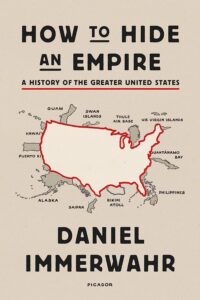
I first learned of this book through an interview with the author on Democracy Now, which I recommend watching before or after you’ve read the book. The book is basically about two maps—one that we’ve been taught in school and another that has been ignored and rarely discussed. The term “empire” applies to other countries but rarely to the United States. Most Americans see their country as a republic born from revolution and, therefore, hostile to imperial rule, but that’s not the case, and therein lies the story.
https://www.youtube.com/watch?app=desktop&v=RvlUGYvLg0s
The map we’re familiar with is of the contiguous fifty states, which doesn’t match the country’s legal borders. This “logo map” ignores Hawaii, Alaska, and Puerto Rico, which have been part of the country since 1899. And what about the actual territories, the atolls, islands, and archipelagos this country has governed and, in many cases, inhabited?
One graph of the census in 1940 lists the territories inhabited, including the Philippines, Puerto Rico, Hawaii, and Alaska. Together, it included over 18 million inhabitants, which was over 12% of the people in the United States.
And even today, those tiny atolls and islands, including Guam, American Samoa, and the U.S. Virgin Islands, represent eight hundred overseas military bases worldwide. To appreciate the implications of this better, the following country with the most military bases is Russia, which has nine, and most countries have none.
Those eight hundred military bases have been instrumental in the history of military interventions by the U.S. We’ve all heard of the wars in Korea, Vietnam, Iraq, and Afghanistan. Still, few appreciate that since 1945, U.S. armed forces have been deployed for conflicts 211 times in 67 countries. And according to Immerwahr, “Call it peacekeeping if you want, or call it imperialism. But clearly, this is not a country that has kept its hands to itself.”
The author divides his history into several segments. The first is the westward expansion, including the expulsion of Native Americans from the land. A second section deals with the middle of the century when the United States started noticing bits of territory outside the continent in the Caribbean and the Pacific.
One of the reasons many Americans ignore U.S. colonialism is that we moved away from traditional methods in favor of innovations in electronics, transportation, and culture, introducing a new approach that did not require the control of colonies.
Racism played a role in this expansion. Some of the most ardent anti-imperialists in the 19th century, like white supremacist John C. Calhoun, a senator from South Carolina, was wary of letting “any but the Caucasian race” into the Union. This was a major concern in the 1867 purchase of Alaska because of so many Eskimos, of which Immerwahr reveals, “The deal went through only because, in the end, there weren’t that many ‘Exqumaux,’ and there was quite a lot of Alaska.”
After diligent research, the author has revealed little-known facts and abuses of those inhabiting U.S. territories while also describing the broad historical trends and nuances that made this expansion possible, although to a great degree, was ignored by the public. His considerable storytelling skills tied the many pieces of history together, making this both compelling and readable.
“Historian Immerwahr argues in this substantial work that . . . for more than two centuries the U.S. has been . . . a kind of empire . . . made up of territories . . . barely acknowledged in popular conceptions of the country . . . This insightful, excellent book, with its new perspective on an element of American history that is almost totally excluded from mainstream education and knowledge, should be required reading for those on the mainland.” ―Publishers Weekly (Starred Review)
Product details
- ASIN : B07D6MGV9Y
- Publisher : Farrar, Straus and Giroux (February 19, 2019)
- Publication date : February 19, 2019
- Language : English
- File size : 75318 KB
- Text-to-Speech : Enabled
- Screen Reader : Supported
- Enhanced typesetting : Enabled
- X-Ray : Enabled
- Word Wise : Enabled
- Sticky notes : On Kindle Scribe
- Print length : 530 pages
- Best Sellers Rank: #21,295 in Kindle Store
The Author
Daniel Immerwahr is an American historian, professor, and associate department chair of history at Northwestern University. His book, Thinking Small, won the Merle Curti Award.
The Reviewer
Mark Walker was a Peace Corps Volunteer in Guatemala and spent over forty years helping disadvantaged people in the developing world with agencies like Food for the Hungry, Make A Wish International, and Hagar USA. His book, Different Latitudes: My Life in the Peace Corps and Beyond, was recognized by the Arizona Literary Association. His second book, My Saddest Pleasures: 50 Years on the Road, won the 2023 Peace Corps Writers’ Award for Best Travel Book. He’s a contributing writer for Literary Traveler, Wanderlust Journal, and The Authors’ Show. “The Million Mile Walker Review: What We’re Reading And Why” can be found in the Arizona Authors’ Association Newsletter, Authors Digest. His wife and three children were born in Guatemala. You can learn more at www.MillionMileWalker.com.